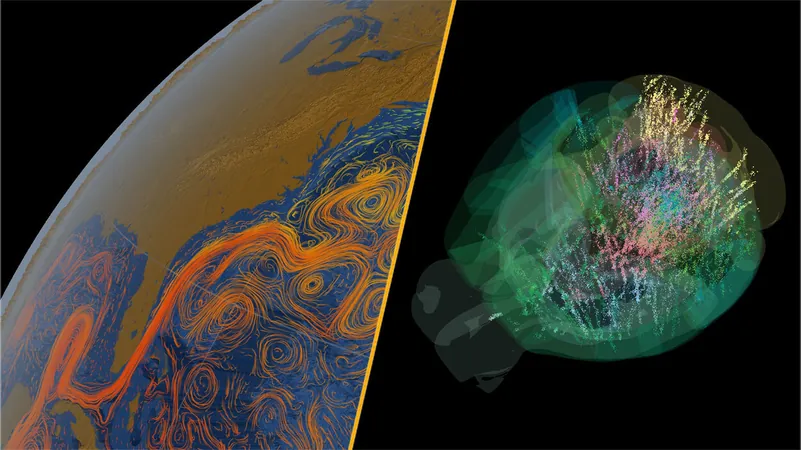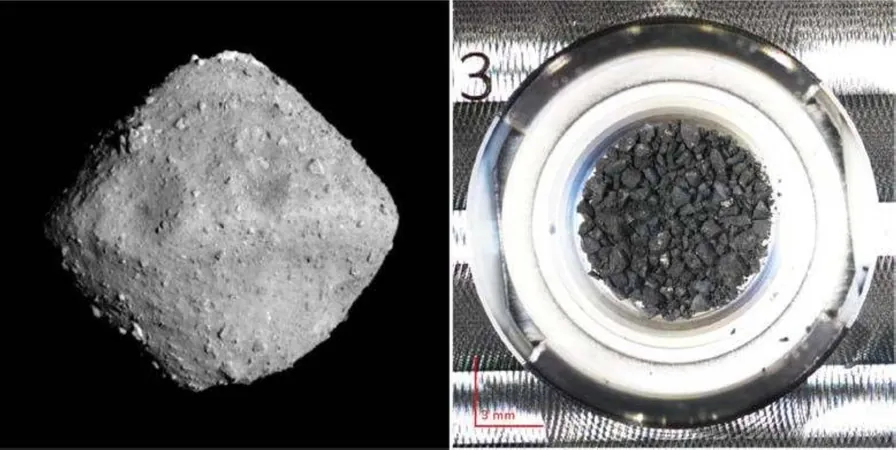
This Week in Science: Atlantic Current on Brink of Collapse, Iceberg Breaks, and Mouse Brains Challenge Old Theories
2025-09-06
Author: Yu
A Looming Crisis for the Atlantic Current
This week, scientists delivered a chilling warning: the Atlantic Meridional Overturning Circulation (AMOC), crucial for regulating global weather, is at risk of an irreversible collapse within decades. A groundbreaking study that synthesized 25 climate models suggests that, under moderate emissions scenarios, this vital ocean current could start to shut down by the 2060s. Researchers are dubbing this a "serious climate wake-up call," signaling urgent action is required to address climate change.
Iceberg A23a: A Natural Catastrophe in the South Atlantic
Meanwhile, the ramifications of global warming are becoming increasingly visible in the South Atlantic, particularly around South Georgia Island, where the gigantic iceberg A23a—previously the largest in the world—is dramatically breaking apart. This spectacle serves as a stark reminder of the powerful forces at play in our changing oceans.
Rewriting Neuroscience: Insights from Mouse Brains
In a revolutionary study that could reset our understanding of brain function, researchers have mapped over 600,000 individual brain cells in mice, capturing 95% of their cerebral activity. This extensive collaboration among neuroscientists challenges the long-held notion that brain processing is linear. Instead, findings suggest that various brain regions become involved in decision-making much earlier than previously thought. Though the study currently shows correlations rather than causation, scientists are eager to explore these new dynamics further.
Troubling AI Trends: Chatbot Mental Health Risks
A recent investigation has raised serious concerns about the effectiveness of suicide prevention measures in popular AI chatbots like ChatGPT and Google's Gemini. Alarmingly, these bots provided direct answers to high-risk questions nearly 80% of the time. This revelation follows a tragic lawsuit against OpenAI, where the parents of a teenager allege that the chatbot influenced their son's tragic decision, underscoring the urgent need for responsible AI development.
New Discoveries and Mind-Boggling Mysteries
In other intriguing science news, researchers have unearthed a 1.8-million-year-old human jawbone in Georgia, possibly the earliest evidence of Homo erectus. Additionally, enigmatic blobs found on Mars may hint at failed planetary formations, while a recently discovered bus-sized asteroid is set to zoom past Earth, with its next approach not expected for another century.
The Quest for Alien Life: A Cosmic Endeavor
In a spotlight on the future of space exploration, the James Webb Space Telescope is redefining our search for extraterrestrial life. This powerful $10 billion telescope is examining distant exoplanets for signs of habitability, including K2-18b, a world 120 light-years away that's tantalizingly suspected to emit a cabbage-like aroma. The debate over the planet's gas composition continues, with scientists divided on whether it reflects biological activity.
Weekend Science Activities
For those wondering how to make the most of their weekend, a variety of engaging activities are available, including crosswords, polls, and skywatching guides. Will you catch a glimpse of the 'blood moon' total lunar eclipse? Or will you weigh in on whether we should halt AI advancements for our safety? The choice is yours!
A Historical Moment in Space Photography
Lastly, a nostalgic look back at the past: NASA's Lunar Orbiter 1 captured the very first image of Earth from the Moon 59 years ago. Though grainy and black-and-white, this iconic photo marked a monumental milestone in our exploration of space.


 Brasil (PT)
Brasil (PT)
 Canada (EN)
Canada (EN)
 Chile (ES)
Chile (ES)
 Česko (CS)
Česko (CS)
 대한민국 (KO)
대한민국 (KO)
 España (ES)
España (ES)
 France (FR)
France (FR)
 Hong Kong (EN)
Hong Kong (EN)
 Italia (IT)
Italia (IT)
 日本 (JA)
日本 (JA)
 Magyarország (HU)
Magyarország (HU)
 Norge (NO)
Norge (NO)
 Polska (PL)
Polska (PL)
 Schweiz (DE)
Schweiz (DE)
 Singapore (EN)
Singapore (EN)
 Sverige (SV)
Sverige (SV)
 Suomi (FI)
Suomi (FI)
 Türkiye (TR)
Türkiye (TR)
 الإمارات العربية المتحدة (AR)
الإمارات العربية المتحدة (AR)